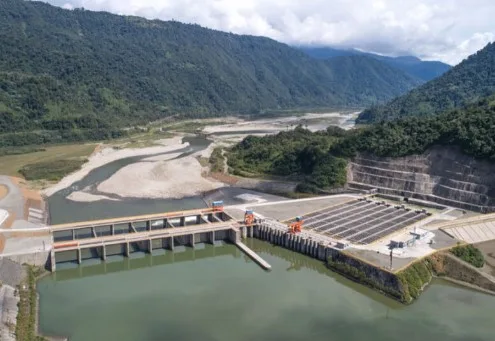Last minute agreement with Colombia averts electric blackout but others are on the horizon
Four hours after announcing that most of Ecuador would go dark on Thursday afternoon, the Energy Ministry said it had reached an agreement with Colombian utility officials that will keep the electricity flowing. Ecuador depends on Colombia to meet about 20% of its power demand.

Because of drought conditions, Ecuador’s hydroelectric generation plants were producing 30% less electricity at the end of September than the country was using. The shortfall was covered with transmissions from Colombia.
According to Gabriel Argüello, director of National Electricity Operations, Colombia agreed to reschedule maintenance work on its power generation system, making the Ecuador shutdown unnecessary. “We appreciate their decision to delay the work and their understanding of the critical situation in Ecuador due to the drought and repairs to our own generation system,” Argüello said.
He did not say when the Colombian work would take place, or whether it will require Ecuadorian blackouts in the future.
In addition to the drought, Argüello said repair work on three hydro-generation plants in Ecuador had left the country with an “electricity deficit.” He said the Sopladora Power Plant east of Cuenca, the country’s second largest, will go back online Thursday or Friday following planned maintenance.
Prior to the agreement with Colombia, the Energy Ministry emphasized that Thursday’s blackout was not the beginning of an “electric rationing regime” that many predict will happen later this year. Several former utility officials say that the current drought will probably be extended due to El Niño and that major power outages should be expected. They claim that mismanagement and corruption have left Ecuador’s electric power generation capacity far below demand. For more about Ecuador’s electricity generation problems, click here.
“This power disconnection is not directly related to low water conditions at our facilities although we are monitoring that situation carefully,” Argüello said before the agreement with Colombia was reached. “This was a result of simultaneous repair operations to our own facilities and those in Colombia, which we depend on to meet national demand.”
Tuesday’s blackout announcement and the subsequent agreement to avert it drew sharp criticism of the government’s management of the electric utility system. “They say this was a one-time crisis, but it illustrates the government’s incompetence in planning for future needs,” said Quito business leader José Alvear. “As far as the current case is concerned, it could have been avoided if President Lasso had fulfilled his promise to spend $80 million on upgrades scheduled for last year. He cancelled the funding and look where we are today.”
Alvear said the blame for inadequate power generation is not Lasso’s alone. “It goes back to the corruption and incompetence in the construction at Coca Coda Sinclair, which has never operated at more than 40% capacity,” he said. “And then, absolutely nothing was done during the Moreno government.”
Last week, an Energy Ministry spokesman acknowledged that power blackouts are possible since Colombia is experiencing drought conditions similar to Ecuador’s. “They may be forced to reduce transmissions to Ecuador to fill their own needs. Planned outages of electric service may be necessary later in the year if we cannot fill our power deficit from Colombia,” he said. “We are also concerned that the El Niño could extend the drought through October and November, and possibly beyond.”
According to the Energy Ministry, Ecuador’s hydroelectric generation fell from 88% of national demand in August to 70% at the end of September.

















